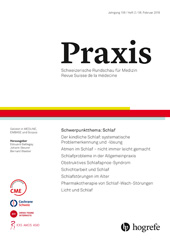Schlafprobleme in der Allgemeinpraxis: Vom Screening zur initialen Therapie – Update 2019
Abstract
Zusammenfassung. Das Fachgebiet Schlafmedizin hat sich international als interdisziplinär ausgerichtete Spezialisierung etabliert. Im neuen Diagnosesystem ICD 11 werden aufgrund der vorliegenden Evidenz die schlafmedizinischen Störungen in einem eigenen Kapitel geführt. Es existiert mit der International Classification of Sleep Disorders (ICSD-3rd revision) ein eigenständiges Klassifikationssystem. In der Schweiz klagt ein Drittel der Bevölkerung über Schlafstörungen. Problematisch ist bereits die Differenzialdiagnose der Patientenbeschwerden. Der vorliegende Artikel richtet sich an Praktiker, die sehr häufig mit der Angabe von Schlafstörungen konfrontiert sind und ihre Patienten mit einfachen Screeningverfahren einordnen, triagieren und sinnvoll erstbehandeln müssen.
Abstract. The field of sleep medicine has established internationally as an interdisciplinary specialization. Due to prevailing evidence, sleep disturbances are listed in a separate chapter in the new ICD 11 classification system. With the International Classification of Sleep Disorders (ICSD-3rd version) a standalone classification system exists. In Switzerland, one third of the population suffers from sleep disturbances. Even differential diagnosis is hard to establish. The current article aims at practitioners, who are frequently confronted with sleep complaints and must categorize, triage and initially treat their patients with simple screening methods.
Résumé. Le domaine de la médecine du sommeil s’est imposé au niveau international comme une spécialité interdisciplinaire. Dans le nouveau système de diagnostic CIM 11, les troubles du sommeil sont énumérés dans un chapitre séparé basé sur les preuves disponibles. Avec la Classification internationale des troubles du sommeil (troisième révision de la DCSI), il existe un système de classification indépendant. En Suisse, un tiers de la population se plaint de troubles du sommeil. Le diagnostic différentiel des plaintes des patients est déjà problématique. Cet article s’adresse aux praticiens qui sont très souvent confrontés à l’annonce de troubles du sommeil et qui doivent classer leurs patients selon des procédures de dépistage simples, les trier et les traiter de manière adaptée.
Bibliografie
ICD-11: International Classification of Diseases 11th Revision : The global standard for diagnostic health information; 2018. https://icd.who.int/; letzter Zugriff: 07.11.2018.American Academy of Sleep Medicine .International classification of sleep disorders. ICSD-3 . (3rd ed.) AASM; Darien, IL: 2014.:
Psychische Gesundheit in der Schweiz ; Neuchâtel; OBSAN2017. http://www.obsan.admin.ch/de/publikationen/psychische-gesundheit-der-schweiz-2; letzter Zugriff: 7.11.2018.: Epidemiological overview of sleep disorders in the general population.
Sleep Med Res 2011; 2: 1–9.: Prevalence of sleep apnoea syndrome in the middle to old age general population.
Lancet Respir Med 2016; 4: e5–e6.: Prävention chronischer Insomnien.
Somnologie 2015; 19: 80–87.:
Leitlinien für Diagnostik und Therapie in der Neurologie: Herausgegeben von der Kommission «Leitlinien» der DGN: Restless-Legs-Syndrom (RLS) und Periodic Limb Movement Disorder (PLMD) . Stuttgart; Thieme: 2012., : Internet-based cognitive behavioral therapy for insomnia: a health economic evaluation.
Sleep 2016; 39: 1769–17678.: Underdiagnosis of obstructive sleep apnoea syndrome in patients with type 2 diabetes in France: ENTRED 2007.
Diabetes Metab 2013; 39: 139–147.: Underdiagnosis of sleep apnea syndrome in U.S. communities.
Sleep Breath 2002; 6: 49–54.: Insomnia in primary care: misreported, mishandled, and just plain missed.
J Clin Sleep Med 2017; 13: 937–939.: Alternative scoring models of STOP-bang questionnaire improve specificity to detect undiagnosed obstructive sleep apnea.
J Clin Sleep Med 2014; 10: 951–958.: Sleepiness in different situations measured by the Epworth Sleepiness Scale.
Sleep 1994; 17: 703–710.: Correlation of the Epworth Sleepiness Scale with respiratory sleep parameters in patients with sleep-related breathing disorders and upper airway pathology. European archives of oto-rhino-laryngology : official journal of the European Federation of Oto-Rhino-Laryngological Societies (EUFOS): affiliated with the German Society for Oto-Rhino-Laryngology.
Head and Neck Surgery 2010; 267: 1645–1648., : Validation of the German version of the insomnia severity index in adolescents, young adults and adult workers: results from three cross-sectional studies.
BMC Psychiatry 2016; 16: 174., : Review of severity rating scales for Restless Legs Syndrome: critique and recommendations.
Mov Disord Clin Pract 2014; 1: 317–324.: Self-reported and measured sleep duration: how similar are they?
Epidemiology 2008; 19: 838–845., : Practice parameters for the role of actigraphy in the study of sleep and circadian rhythms: an update for 2002.
Sleep 2003; 26: 337–341.DGSM . S3-Leitlinie Nicht erholsamer Schlaf/Schlafstörungen – Kapitel «Schlafbezogene Atmungsstörungen».Somnologie 2017; 20 (Suppl s2): 97–180.: Increased prevalence of sleep-disordered breathing in adults.
Am J Epidemiol 2013; 177: 1006–1014.: The prevalence of obstructive sleep apnea in patients with atrial fibrillation.
Clin Cardiol 2018; 41: 601–607., : The why, when and how to test for obstructive sleep apnea in patients with atrial fibrillation.
Clin Res Cardiol 2018; 107: 617–631.: Obstructive sleep apnea is underrecognized and underdiagnosed in patients undergoing bariatric surgery.
European Archives of Oto-Rhino-Laryngology 2012; 269: 1865–1871., : Obstructive sleep apnea: the effect of bariatric surgery after 12 months. A prospective multicenter trial.
Sleep Med 2017; 35: 85–90. [ https://doi.org/10.1016/j.sleep.2016.12.017][PMID: 28549834], : Prävalenz schlafbezogener Atmungsstörungen bei stationären Patienten mit psychischen Erkrankungen.
Nervenarzt 2018; 89: 807–813.: Obstructive sleep apnea (OSA) and clinical depression-prevalence in a sleep center.
Sleep Breath 2017; 21: 311–318.: Obstructive sleep apnea and the subsequent risk of depressive disorder: a population-based follow-up study.
J Clin Sleep Med 2013; 9: 417–423.: Obstruktive Schlafapnoe bei Patienten mit Typ-2-Diabetes.
Diabetologe 2012; 8: 415–425. [ https://doi.org/10.1007/s11428-012-0929-7]: Sleep apnea and type 2 diabetes.
J Diabetes Investig 2018; 9: 991–997.: Cardiovascular disease risk in obstructive sleep apnea: an update.
J Sleep Disord Ther 2017; 7: pii: 283.: Sleep disturbances as a risk factor for stroke.
J Stroke 2018; 20: 12–32.: Role of sleep-disordered breathing and sleep-wake disturbances for stroke and stroke recovery.
Neurology 2016; 87: 1407–1416.: The costs of disorders of the brain in Switzerland: An update from the European Brain Council Study for 2010.
Swiss medical weekly 2013; 143: w13751., : S3-Leitlinie Nicht erholsamer Schlaf/Schlafstörungen.
Somnologie 2017; 21: 2–44.: Wie kann die State-of-the-Art-Therapie für Insomnie verbessert werden?
DNP 2016; 17: 23–24.: Schwere chronische Insomnien stationär behandeln.
Schlaf 2016; 05: 136–140.KSM: Online-Schlaftherapie: Bad Zurzach; SOMNET –
Fachinformationen 2018 . https://www.ksm-somnet.ch/de/online-schlaftherapie; letzter Zugriff: 07.11.2018.



